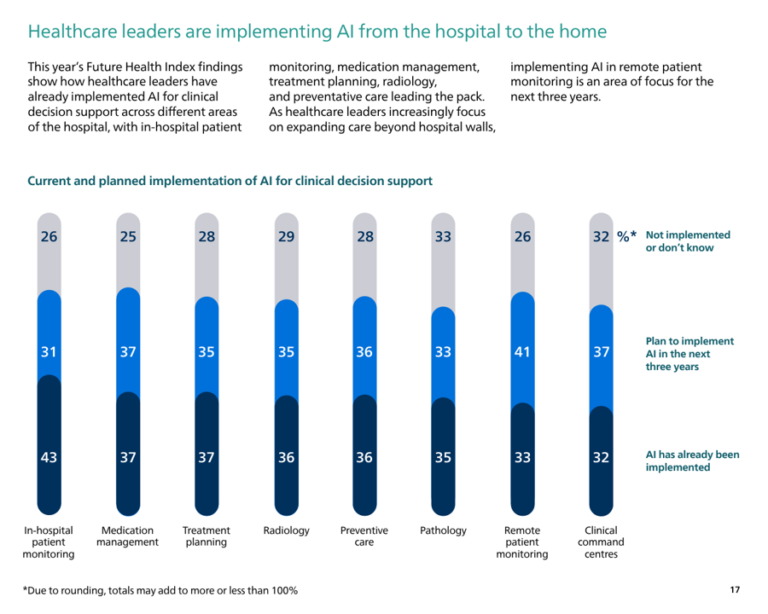Philips Future Health Index 2025: Urgent Call To Action On AI In Healthcare

Table of Contents
Key Findings from the Philips Future Health Index 2025
The Philips Future Health Index 2025 reveals a global healthcare system struggling under the weight of increasing demands and dwindling resources. The report highlights a perfect storm of challenges, creating a critical need for innovative solutions. This crisis is characterized by:
-
Growing healthcare workforce shortages: A significant and persistent gap exists between the supply of healthcare professionals and the growing demand for their services. This shortage is impacting access to care and leading to burnout among existing staff.
-
Increasing demand for healthcare services: Aging populations, rising chronic disease rates, and advancements in medical technology are driving an unprecedented increase in the demand for healthcare services, exceeding the capacity of many systems.
-
The potential of AI to alleviate these pressures: The report emphasizes the significant potential of AI to address these challenges. AI offers the possibility of improving efficiency, enhancing diagnostic accuracy, and providing personalized care, ultimately helping to alleviate the strain on the healthcare system.
Specific examples of AI applications highlighted in the report include:
- AI-powered diagnostics: AI algorithms are proving increasingly accurate in detecting diseases like cancer and heart conditions, often earlier and more efficiently than traditional methods.
- Personalized medicine: AI enables the tailoring of treatment plans to individual patients based on their genetic makeup, lifestyle, and medical history, leading to more effective and targeted therapies.
- Remote patient monitoring: AI-enabled wearable devices and remote monitoring systems allow for continuous tracking of patients' vital signs, enabling early intervention and preventing hospital readmissions.
The report also includes data revealing that patients are increasingly receptive to AI-powered healthcare, expressing a willingness to embrace technology that improves access, efficiency, and the overall quality of care.
The Urgent Need for Increased AI Adoption in Healthcare
The Philips Future Health Index 2025 doesn't just identify problems; it provides a compelling case for the urgent adoption of AI in healthcare. The potential benefits are transformative:
-
Improved diagnostic accuracy and speed: AI algorithms can analyze medical images and patient data significantly faster and more accurately than humans, leading to quicker diagnoses and more effective treatment. This is especially crucial in time-sensitive situations.
-
Enhanced treatment planning and personalized medicine: AI facilitates the development of personalized treatment plans based on individual patient characteristics, maximizing the effectiveness of interventions and minimizing adverse effects. This represents a paradigm shift towards more precise and patient-centric care.
-
More efficient resource allocation: AI can optimize resource allocation within healthcare systems, improving workflow, scheduling, and staffing to maximize efficiency and minimize wasted resources.
-
Potential for cost savings in the long run: While initial investments in AI infrastructure and development are required, the long-term cost savings from improved efficiency, reduced errors, and better preventative care are significant.
-
Improved patient experience through better access and convenience: AI-powered telehealth platforms and remote monitoring systems expand access to care, particularly for patients in remote areas or with mobility limitations.
Addressing ethical considerations and data privacy concerns is paramount. Transparency and robust data security measures are essential to ensure responsible AI implementation and build public trust.
Overcoming Barriers to AI Adoption
Despite the clear benefits, several significant barriers hinder the widespread implementation of AI in healthcare:
-
Investment requirements for AI infrastructure and development: Significant financial investment is needed to develop, implement, and maintain AI infrastructure, including specialized hardware, software, and data storage.
-
Need for clear regulatory frameworks and ethical guidelines: Clear guidelines and regulations are essential to ensure the ethical and responsible use of AI in healthcare, addressing issues such as data privacy, algorithm bias, and liability.
-
Addressing data security and privacy concerns: Protecting patient data is crucial. Robust security measures and compliance with data privacy regulations are essential to ensure public trust and prevent data breaches.
-
Training healthcare professionals to effectively utilize AI tools: Healthcare professionals need adequate training and support to effectively utilize AI tools and integrate them into their workflows. This requires investment in education and ongoing professional development programs.
-
Integration challenges with existing healthcare systems: Integrating AI technologies into existing healthcare systems can be complex, requiring significant interoperability efforts and potentially substantial modifications to existing workflows.
The Future of AI in Healthcare: Opportunities and Predictions
The potential benefits of AI in healthcare extend far beyond current applications. The future holds exciting possibilities:
-
Predictive analytics for disease prevention: AI can analyze patient data to identify individuals at high risk of developing specific conditions, allowing for proactive interventions to prevent disease onset.
-
Advanced robotics and surgical assistance: Robotic surgery assisted by AI promises increased precision, minimally invasive procedures, and faster recovery times.
-
AI-powered drug discovery and development: AI can accelerate the drug discovery and development process, leading to faster development of new treatments and cures for diseases.
-
Improved remote patient monitoring and telehealth: AI-powered remote monitoring systems will continue to evolve, enabling more comprehensive and proactive patient care.
-
Increased accessibility of healthcare in underserved areas: AI-powered telehealth and remote diagnostic tools can significantly improve access to healthcare in underserved and remote areas.
Conclusion
The Philips Future Health Index 2025 underscores the critical role of AI in addressing the escalating challenges facing healthcare systems globally. Increased AI adoption is not merely desirable; it's essential for improving patient care, optimizing resource allocation, and building a more sustainable and equitable healthcare future. The report's findings serve as a powerful call to action.
The time for action is now. Let's embrace the transformative potential of AI in healthcare, working collaboratively to overcome existing barriers and unlock the benefits of this powerful technology. We must advocate for increased investment in AI research, development, and implementation to truly harness the power of the Philips Future Health Index 2025's insights and build a healthier future with AI. Learn more about the Philips Future Health Index and join the conversation on AI in healthcare today!

Featured Posts
-
 Hawaii Keiki Showcase Artistic Talents Sew A Lei For Memorial Day Poster Contest
May 24, 2025
Hawaii Keiki Showcase Artistic Talents Sew A Lei For Memorial Day Poster Contest
May 24, 2025 -
 Sterke Aex Prestaties Ondanks Onrust Op Wall Street
May 24, 2025
Sterke Aex Prestaties Ondanks Onrust Op Wall Street
May 24, 2025 -
 Frankfurt Stock Market Dax Climbs Record High In Sight
May 24, 2025
Frankfurt Stock Market Dax Climbs Record High In Sight
May 24, 2025 -
 8 Stock Market Jump On Euronext Amsterdam Impact Of Trumps Tariff Action
May 24, 2025
8 Stock Market Jump On Euronext Amsterdam Impact Of Trumps Tariff Action
May 24, 2025 -
 Green Spaces And Mental Health Lessons From The Seattle Pandemic
May 24, 2025
Green Spaces And Mental Health Lessons From The Seattle Pandemic
May 24, 2025
Latest Posts
-
 Farrows Plea Hold Trump Accountable For Venezuelan Gang Member Deportations
May 24, 2025
Farrows Plea Hold Trump Accountable For Venezuelan Gang Member Deportations
May 24, 2025 -
 Actress Mia Farrow Trump Should Face Charges For Venezuela Deportation Policy
May 24, 2025
Actress Mia Farrow Trump Should Face Charges For Venezuela Deportation Policy
May 24, 2025 -
 Farrow Seeks Trumps Imprisonment Following Venezuelan Deportation Controversy
May 24, 2025
Farrow Seeks Trumps Imprisonment Following Venezuelan Deportation Controversy
May 24, 2025 -
 Mia Farrows Plea Imprison Trump For Venezuelan Deportation Policy
May 24, 2025
Mia Farrows Plea Imprison Trump For Venezuelan Deportation Policy
May 24, 2025 -
 The Four Women Who Married Frank Sinatra Their Stories And Impact
May 24, 2025
The Four Women Who Married Frank Sinatra Their Stories And Impact
May 24, 2025
